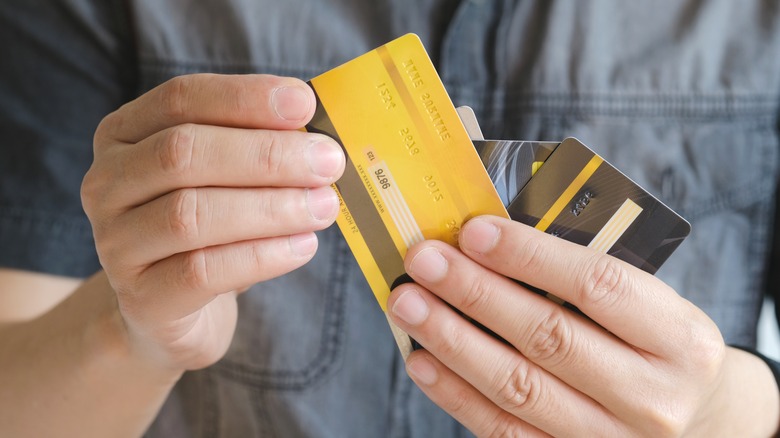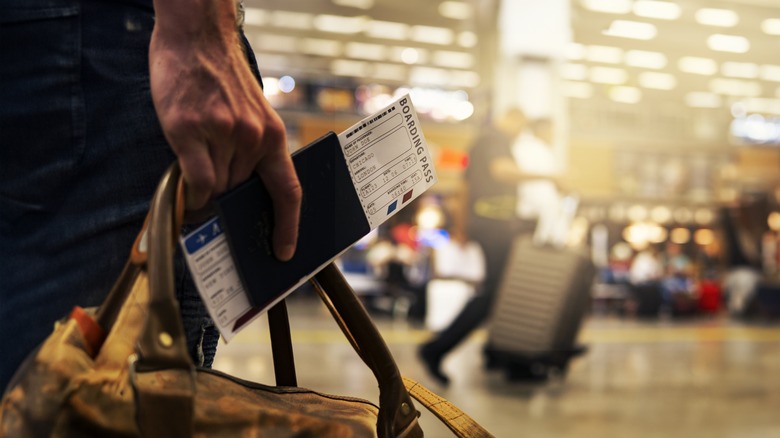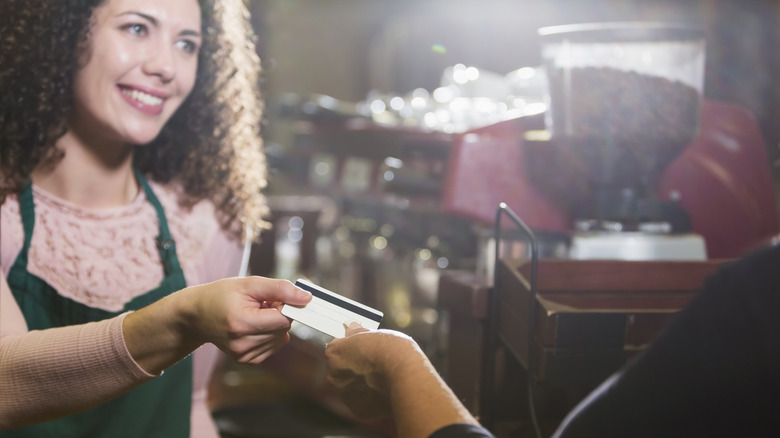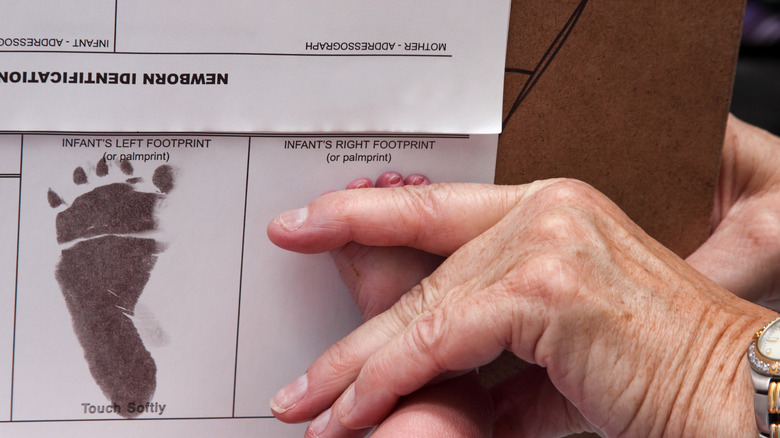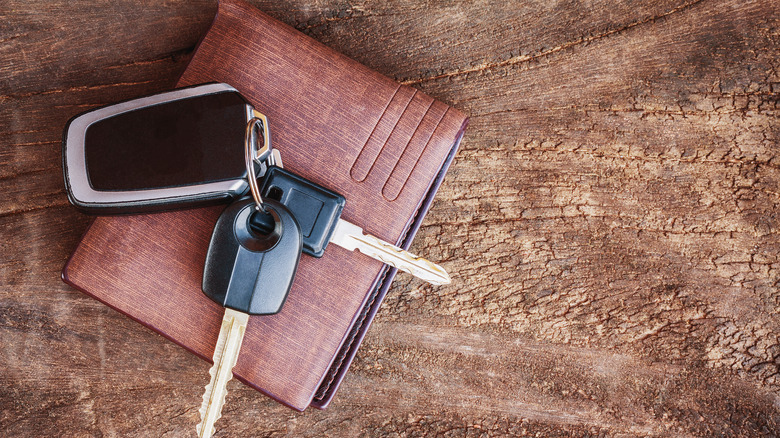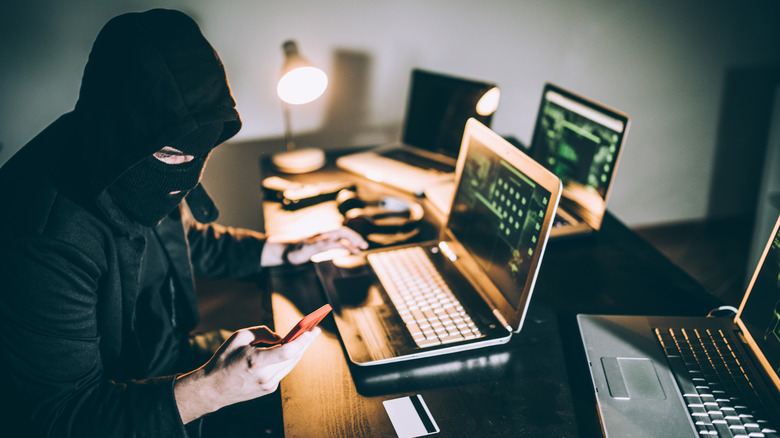Things You Should Never Keep In Your Wallet
There's a popular series of credit card commercials featuring actors like Samuel L. Jackson and Jennifer Garner where the catchline is, "So what's in your wallet?" While a credit card may be the obvious answer, there are several things that both financial and security experts agree you should never keep in your wallet. Consider a survey where 62% of participants admitted to either losing their wallets through theft or misadventure, with a third of participants experiencing loss both ways at some point in their lives. If you've suffered through either predicament, you understand the damage this can do to your finances and even more so, your time. Almost half of people (45%) who lose their wallets will have to spend a whole day trying to cancel financial cards and replace other important identification like social security or driver's licenses.
Your wallet is one of the top six items you'll lose according to another survey that people will lose, on average, two and a half days per year searching for these things — an estimated $2.7 billion expense in time and money to replace nationally. By taking to heart some of our suggestions in the list below, you should be able to avoid most of these unnecessary, and avoidable, time and money-draining situations.
Receipts
Most of us grew up remembering our parents' or grandparents' wallets overflowing with paper, with as many receipts for purchases in their folds as money. Here's why you shouldn't do that. The Federal Trade Commission (FTC) has rules in place for merchants who issue electronic receipts through the Fair and Accurate Credit Transactions Act (FACTA). According to the FTC, where electronically printed credit and debit card receipts are concerned, merchants should reveal less than six digits of your card number on the receipt, with no expiry date included to protect consumers from fraud. However, even though the merchant is obligated by law to do all in their power to keep your personal information safe, the act doesn't cover transaction records kept at the time of purchase, nor does it include handwritten or imprinted receipts.
Whether issued through electronic means or by hand, the best thing you can do right after being handed your receipt is to ensure no more than five digits of your card, and no expiry date information has been included. If they have, you can contact the FTC and the merchant could be fined anywhere from $100 to $1,000 for violating the law. Subway found this out the hard way after getting hit with a $30 million class action lawsuit when 2.6 million customers discovered that their card expiry dates were being printed on their receipts. After informing the FTC and providing them a copy of that receipt, be sure to destroy it.
Social Security card
The Social Security Administration (SSA) lists the misuse of your SIN number by criminals for credit card applications, employment through false identity, and even the filing of tax returns as some of the dangers of someone gaining access to your card number. However, the official policy around loss or theft of your card doesn't allow the agency to reissue you a new card until there's sufficient proof that your identity has been stolen for nefarious purposes. By that time, your credit could be ruined, and bad credit affects you in more ways than you realize. Nevermind the time-burglarizing experience of reporting your suspicions of theft to different government organizations, including IdentityTheft.gov, the Internal Revenue Service (IRS), and the Internet Crime Complaint Center (IC3), the latter of which works with law enforcement agencies like the Federal Bureau of Investigations (FBI) to report suspected cybercrime.
Avoid the headache of lost social insurance cards by not carrying them in your wallet to begin with. Instead, keep them in a safe place at home with your other important documents and try to memorize your number. Look to tech companies offering digital wallets with password protection, encryption, and even biometric authentication to save your social insurance info. Google Wallet offers two-step verification, encryption, and the ability to erase the info in your digital wallet remotely. Pair that with the monitoring services of Aura, which can track activity, even on the Dark Web, and let you know of any funny business.
Work ID access cards
The workplace usually requires some form of identification. ID cards offer the modern workplace extra security through technology like RFID chips that allow card access to controlled areas, recorded entry logs accounting for who gained access where and when, and visual deterrence through photo identification. ID cards today are more than just employee photos. However, none of that tech means anything if you lose your card.
Most workplaces are still using 25-year-old technology that fraudsters have figured out how to clone. If there's a "Key Me" kiosk or a card cloning reader sold at your local hardware store or pharmacy, your ID access card can become a security breach in seconds. On average, a company with 40,000 employees will lose 10,378 key cards per year. When you consider that theft costs businesses $50 billion annually, with 57% of thefts based on the actions of employees and outsiders, there are any number of ways keeping your ID in your wallet can burn you. Apple Wallet's employee badge feature allows users to access their workplace by waving their phone over card readers. It will also store ID card photos for visual access. If nothing else, only bring your card to and from work. On days off, leave the card at home, not in your wallet.
Multiple credit cards
Should you carry all of your credit cards in your wallet? According to Credit.com, there were 389,000 cases of credit card fraud in 2021 reported to the Federal Trade Commission (FTC), with the opening of new credit card accounts or the use of stolen credit cards being the most common form of credit fraud leading to $32 billion of losses in the U.S.
Credit card encryption employs an algorithm that jumbles up personal information stored in its magnetic stripe and chip, allowing you to swipe or tap your card for purchases. The magnetic stripes make it easier for thieves to lift your information for nefarious purposes by running them through skimming machines. This is another job for digital technology that enables you a single physical card — or none at all — by storing your credit card numbers in a virtual platform. Virtual credit card numbers only exist in the digital realm and can create 16 random numbers associated with your physical card, which protects your real card information from fraud. Unlike payment apps, which use tokenization software unique to specific apps, virtual numbers can be used across platforms with any merchant that allows for online payments. Many credit cards, including Citi, Wells Fargo, Visa, Mastercard, and Amex, already offer virtual cards. So now, losing your wallet doesn't mean canceling and replacing several cards, or falling victim to fraud.
Checkbooks or checks
Although watermarks and gradient backgrounds were 90% successful in reducing check fraud in 2018, $1.3 billion in losses in the same year could still be attributed to fraudulent transactions. Since checks contain your name, address, and checking account info, it's pretty obvious that losing a check or worse, your checkbook, could prove disastrous to your financial security. While knowing how to properly void a cheque can provide a basic level of fraud protection, if you're carrying around a blank cheque in your wallet and lose it through carelessness or theft, that's not likely to help you.
Losing your check or checkbook to thieves can result in duplicates of your checks, and that could quite quickly lead to a drained bank account. If you lose a check, you do have options. Immediately contact your financial institution to alert them of the loss before thieves have the chance to commit fraud, in which case they'll likely place a freeze on your checking account. Aside from the hassle of losing your wallet and checks, you'll have to go through the trouble of getting them all replaced, not to mention the inability to pay any bills that regularly come out of your account which could lead to declined or bounced transactions. Avoid all the hassle and headache by only carrying checks you plan to deposit the same day, preferably on a direct trip.
Passport or passport cards
If you're one of the 15.9% of U.S. citizens without a driver's license, you may carry around your passport as an acceptable form of ID. According to Allianz Travel, passports employ RFID technology to store information about you that fraud artists can skim with readers from 10 feet away. They don't even have to actually steal the documents from you in order to steal your identity from them. A better way to carry your passport or card is with a specially designed travel wallet that blocks RFID scanners, and to carry two wallets on your person to throw off pickpockets. While that may make sense for traveling, in the every day where you're not headed to the airport or leaving the country, it's still pretty risky.
Digital wallets to the rescue. Apple allows you to carry a digital version of your identification, including your state ID, on your iPhone or Apple Watch. You can even use it at TSA checkpoints by employing either touch or facial recognition software to gain access. So now, you never have to go to the bar with your hard-to-replace passport ever again.
Gift cards
On birthdays and holidays, you're bound to end up with gift cards. While no one would blame you for wanting to have them handy for spontaneous opportunities, you may not want to walk around with them in your wallet. The Federal Trade Commission (FTC) advised that 40,000 Americans reported losing the equivalent of $148 million in stolen gift cards in the first nine months of 2021. By the end of 2022, those numbers had ticked up to 48,000 people and $228 million in stolen cards. Gift cards as an easy way to make entirely anonymous, untraceable, and irreversible cash transactions for thieves. Unlike a lost credit card or check, there's no way to freeze access to the money on the card, however, gift cards purchased by credit cards with fraud protection might be eligible for liability through the credit card company. That's not a given though since gift cards aren't usually eligible for liability protection.
Buying gift cards from a store's display rack could get you scammed, and it usually starts with someone's gift card getting stolen. According to Today, thieves lift your stolen gift card number and security code information, seal it in a gift card package, and leave it on a store rack to be picked up by someone else. The next person who picks up and loads funds on the card will have those funds instantly drained by the thieves. Leave gift cards at home until you're ready to use them.
Birth certificate
As per the Department of Health and Human Services 2020 report on "Birth Certificate Fraud," birth certificates open the door to major identity fraud since, at the time, there were 14,000 different versions of birth certificates in circulation with 85% to 90% of fraud cases being related to genuine birth certificates used by scammers. Since the U.S. has a decentralized, state-managed birth certificate system with different states issuing certificates with unique-looking cards, it's difficult to detect stolen certificates.
A stolen birth certificate can be used to access pension benefits, passports, driver's licenses, social security cards, public assistance, or even your bank account if the thief is bold enough to walk into a bank and try it. There's very little reason you need to be walking around with your birth certificate, and with digital wallets around, you can carry your birth certificate safely encrypted on your phone instead of a physical wallet. Leave the birth certificate in a safe place at home.
House keys
If you carry around spare keys in your wallet, think about all the ways that losing the spare keys to your home or car inside could be a boon to thieves. In one fell swoop, you've provided your home address and vehicle information — your driver's license would do the job — and the keys to both. The average cost to replace a lost key is around $50 to $100, while changing the locks on your home can be as high as $200. A replacement car key will set you back anywhere from $65 to $145, and changing the locks will cost $75 to $220. Carryology suggests auditing keys you carry since we often carry around more than we need. Aside from the rattling, packed keyrings are unwieldy, inefficient to sort through, and scratch pants, legs, wallets, and hands. Carryology offers several key organizers that carry your keys neatly in a Swiss Army style for easy carriage and use.
Where spare keys are concerned, consider trusted friends and family as opposed to your wallet. Technology offers solutions too. For instance, combining the power of Apple CarKey, Apple Wallet, and Apple Home would remove the likelihood of losing wallets or keys. As long as you have iOS 14 or better, you can unlock your vehicle and home, while securing your wallet all at the same time. Purchase compatible locks for your digital system and use your phone or Apple Watch to open doors.
PIN and password information
According to the Pew Research Center, weak passwords, old security apps, and untrustworthy Wi-Fi networks all contribute to breaches in online security. The top two ways most Americans deal with PINs and passwords is to memorize them, or 49% of us choose to write them down. That's almost half the population writing down their sensitive access information. Carrying around this info in your wallet gives thieves the keys to your entire kingdom. Someone without the benefit of reading this article may be keeping credit cards, debit cards, gift cards, spare keys, birth certificates, and everything else on this list in their wallet. Combine that with access to your online banking, credit, or social insurance, and you have a big problem.
If you have janky memory, consider tools like multi-factor authentication. You can do away with multiple passwords by pairing a single password you'll remember with fingerprints or facial recognition. You can have a verification code texted to your phone and a password required to gain access to your digital life. Password managers like LastPass can store an unlimited amount of secure passwords in an encrypted password vault, meaning you don't need to write them down or even memorize them. Now you don't need to walk around with passwords and PINs in your wallet.
Medicare card
On average, it takes 30 days to get a new Medicare card after it's been lost, damaged, or stolen. Aside from being a waste of time, medicare identity fraud allows thieves access to prescription filling, medical equipment, treatment, and the ability to submit false insurance claims all under your name. The result of this fraud could be inaccurate medical records, denied or limited health coverage, unexpected medical bills, and a wrecked credit score since all the resulting surprise debt from unpaid bills could add up quickly if not caught in time.
As with your other important identification, there's an app for that. We've been toting Apple quite a bit so let's break that up with the Samsung Wallet. It does pretty much everything Apple does where storing card information is concerned, and more importantly, is a safer place to store your medicare card than your wallet. The bottom line is to leave your physical card at home and safely away from your wallet.




